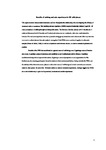Benefits of walking and solo experiences in UK wild places
| dc.contributor.author | Freeman, E | |
| dc.contributor.author | Akhurst, J | |
| dc.contributor.author | Bannigan, K | |
| dc.contributor.author | James, H | |
| dc.date.accessioned | 2016-08-15T22:31:21Z | |
| dc.date.available | 2016-08-15T22:31:21Z | |
| dc.date.issued | 2016-05-17 | |
| dc.identifier.issn | 0957-4824 | |
| dc.identifier.issn | 1460-2245 | |
| dc.identifier.uri | http://hdl.handle.net/10026.1/5303 | |
| dc.description.abstract |
This paper examines human-nature interaction and how therapeutic this relationship is by investigating the efficacy of structured outdoor experience. Two walking and solo experience (WSEs) explored university students' (aged 20-43 years) perceptions of walking through and being with nature. The first was a 5-day journey (n = 4; 3 females and 1 male) and the second (n = 5; 3 females and 2 males) took place over two weekends, with a 2-week interval in-between. Pre- and post-experience interviews, journal writing, group discussions and a 9-month follow-up interviews were used to collect data and thematic analysis [Braun and Clarke (Using thematic analysis in psychology. Qual Res Psychol 2006;3:77-101.)] was applied. Both WSEs were considered together during analysis, as well as comparisons made between the two, in order to evaluate implications for practice. Benefits of the WSE that contributed to a general sense of well-being were: (i) gaining a sense of freedom and escape; (ii) gaining a sense of awareness and sensitivity to one's environment and its influence (iii) gaining confidence in being able to cope and take action; (iv) gaining a sense of perspective on and appreciation for life. Furthermore, the meaning participants formed in relation to their environment before, during and after the WSE, and the activity within that environment, played a role in their sense of well-being and in their motivations to re-access nature in other places. Findings suggest that WSEs are a cost effective way to give rise to beneficial and durable experiences, but a more holistic approach to policy is needed. | |
| dc.format.extent | daw036-daw036 | |
| dc.format.medium | ||
| dc.language | en | |
| dc.language.iso | en | |
| dc.publisher | Oxford University Press (OUP) | |
| dc.subject | well-being | |
| dc.subject | environment and public health | |
| dc.title | Benefits of walking and solo experiences in UK wild places | |
| dc.type | journal-article | |
| dc.type | Article | |
| plymouth.author-url | https://www.ncbi.nlm.nih.gov/pubmed/27190225 | |
| plymouth.issue | 6 | |
| plymouth.volume | 32 | |
| plymouth.publication-status | Published online | |
| plymouth.journal | Health Promotion International | |
| dc.identifier.doi | 10.1093/heapro/daw036 | |
| plymouth.organisational-group | /Plymouth | |
| plymouth.organisational-group | /Plymouth/Faculty of Health | |
| plymouth.organisational-group | /Plymouth/Research Groups | |
| plymouth.organisational-group | /Plymouth/Research Groups/Institute of Health and Community | |
| plymouth.organisational-group | /Plymouth/Users by role | |
| dc.publisher.place | England | |
| dcterms.dateAccepted | 2016-03-20 | |
| dc.rights.embargodate | 2017-05-17 | |
| dc.identifier.eissn | 1460-2245 | |
| dc.rights.embargoperiod | 12 months | |
| rioxxterms.versionofrecord | 10.1093/heapro/daw036 | |
| rioxxterms.licenseref.uri | http://www.rioxx.net/licenses/under-embargo-all-rights-reserved | |
| rioxxterms.licenseref.startdate | 2016-05-17 | |
| rioxxterms.type | Journal Article/Review |


